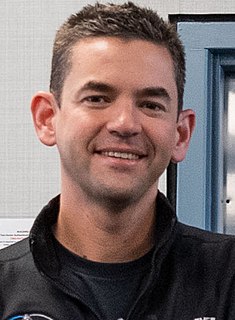A Quote by David Letterman
President Bush wants to build a space station on the moon. And from the moon, he wants to launch people to Mars. You know what this means. He's been drinking again.
Related Quotes
People say, oh we just need charismatic leaders to continue on to Mars. Now we've gone to the moon, of course Mars is next. No. Mars was never, of course, next. It is next if you think we went to the moon because we're explorers, but if you know we went to the moon because we were at war then we're never going to Mars. There's no military reason to do it, to justify the expenditure.
To send humans back to the moon would not be advancing. It would be more than 50 years after the first moon landing when we got there, and we'd probably be welcomed by the Chinese. But we should return to the moon without astronauts and build, with robots, an international lunar base, so that we know how to build a base on Mars robotically.
Astronauts will remain the explorers, the pioneers-the first to go back to moon and on to Mars. But I think it's really important to make space space available to as many people as we can. It's going to be a while before we can launch people for less than $20 million a ticket. But that day is coming.
We will eventually build space science labs and hotels, prodding the capability for missions beyond the orbit of the Earth. Our space-hotel guests will be able to take breath-taking excursions, flying a couple of hundred feet above the Moon's surface in small two-man spaceships. In time, we will launch missions to Mars and beyond.
The Moon is a white strange world, great, white, soft-seeming globe in the night sky, and what she actually communicates to me across space I shall never fully know. But the Moon that pulls the tides, and the Moon that controls the menstrual periods of women, and the Moon that touches the lunatics, she is not the mere dead lump of the astronomist. . . . When we describe the Moon as dead, we are describing the deadness in ourselves. When we find space so hideously void, we are describing our own unbearable emptiness.
I know enough about the moon to know how unpleasant and inhospitable it is. . . . I know enough about Mars to know that you can't live there, you can't settle it. Mars and the moon are two ugly islands. So then, you say, what's the point of going to them? The point is to be able to say I've been there, I've set foot on them, and I can go further to look for beautiful islands.




























